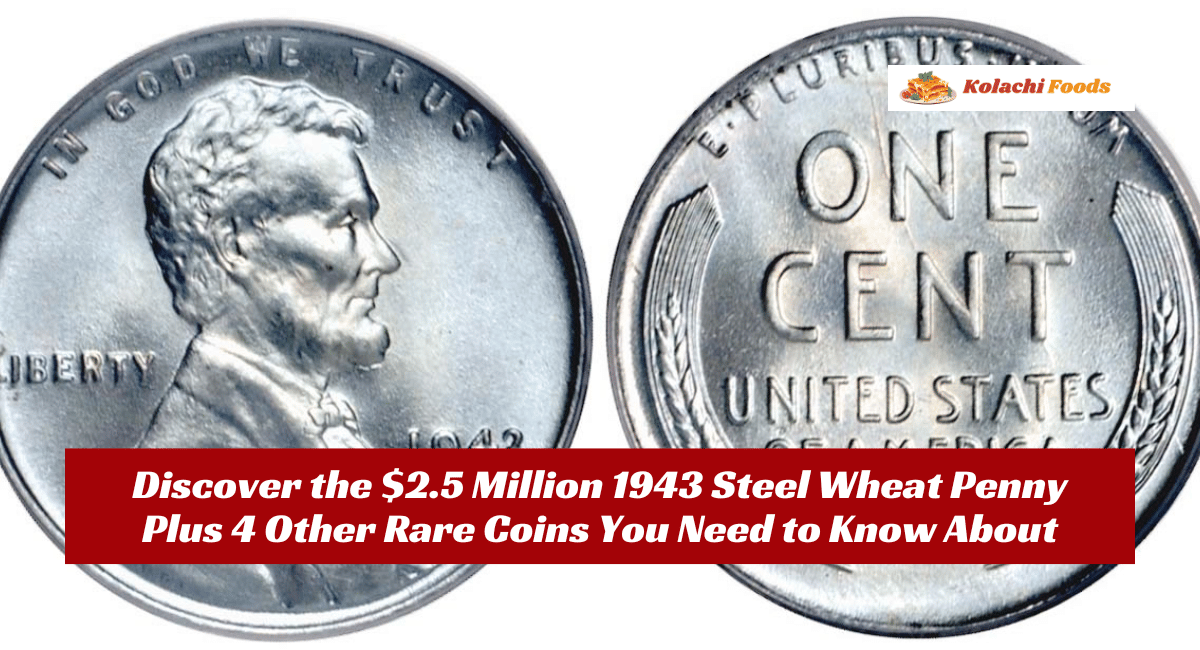During World War II, the U.S. Mint needed copper for wartime supplies, so some pennies were made from steel instead. This change led to the creation of one of the most unique and valuable coins in history: the 1943 Steel Wheat Penny.
A few rare copper pennies were mistakenly minted that year, making them extremely valuable to collectors. In this article, we’ll explore some of the most sought-after pennies, including the famous 1943 Steel Wheat Penny, and discuss why these coins are worth so much.
The 1943 Steel Wheat Penny
The 1943 Steel Wheat Penny is unique because it was made from steel rather than the usual copper. This was done to save copper for the war effort. While millions of steel pennies were produced, a small number of copper ones were accidentally minted. These rare copper coins are worth a fortune, with some fetching up to $2.5 million at auction.
The 1909-S VDB Wheat Penny
The 1909-S VDB Wheat Penny is another prized collector’s item. Its rarity comes from the limited number of coins produced and the inclusion of the initials “V.D.B.” of its designer, Victor David Brenner, on the reverse. Only 484,000 of these pennies were made, and in excellent condition, they can be worth over $100,000.
The 1914-D Wheat Penny
The 1914-D Wheat Penny is rare because it was produced in limited numbers at the Denver Mint. This penny becomes even more valuable in mint condition, with collectors paying a premium for well-preserved versions. A 1914-D penny can sell for over $100,000 depending on its grade.
The 1922 No D Wheat Penny
The 1922 No D Wheat Penny is an error coin, meaning it was minted without the “D” mint mark that indicates it came from the Denver Mint. This mistake has made it a highly valuable collector’s item, with some coins selling for tens of thousands of dollars, depending on their condition.
The 1944 Steel Wheat Penny
Most 1944 pennies were made from copper, but a few were mistakenly struck using leftover steel from the previous year. These rare 1944 steel pennies are valuable due to their rarity and can sell for thousands of dollars. Finding one is a big deal for any collector.
Coin Value Comparison Table
| Coin | Year | Material | Rarity | Estimated Value |
|---|---|---|---|---|
| 1943 Steel Wheat Penny | 1943 | Steel | Common | Up to $50 (Steel) |
| 1943 Copper Wheat Penny | 1943 | Copper (Mistake) | Extremely Rare | Up to $2.5 million |
| 1909-S VDB Wheat Penny | 1909 | Copper | Rare | $100,000+ |
| 1914-D Wheat Penny | 1914 | Copper | Limited Production | $100,000+ |
| 1922 No D Wheat Penny | 1922 | Copper (Error) | Rare Error | Tens of thousands of dollars |
FAQs
1. What makes the 1943 Steel Wheat Penny so special?
The 1943 Steel Wheat Penny was made from steel to conserve copper during World War II. However, a few copper versions were accidentally minted, making them extremely valuable and highly sought after by collectors.
2. How can I tell if I have a rare copper 1943 penny?
You can test your 1943 penny with a magnet. If it sticks to the magnet, it’s made of steel. If it doesn’t, you may have a rare copper version, which is worth significantly more. You should get it authenticated by a professional.
3. Why is the 1909-S VDB penny valuable?
The 1909-S VDB Wheat Penny is valuable because only 484,000 were minted, and it features the initials of the designer, Victor David Brenner, on the reverse. This combination of limited supply and historical significance makes it highly desirable.
4. What’s an error coin, and why is the 1922 No D Wheat Penny so valuable?
An error coin is a coin that has a mistake in its design, minting, or composition. The 1922 No D Wheat Penny is valuable because it was minted without the “D” mint mark from the Denver Mint, making it a rare and valuable error.
5. What should I do if I think I have a valuable penny?
If you think you have a valuable penny, get it professionally appraised. A numismatist or coin grading service can authenticate it and assess its value based on rarity, condition, and market demand.
READ MORE: The Auction-Worthy 5-Cent Coin That Could Pay For Your Next Adventure

